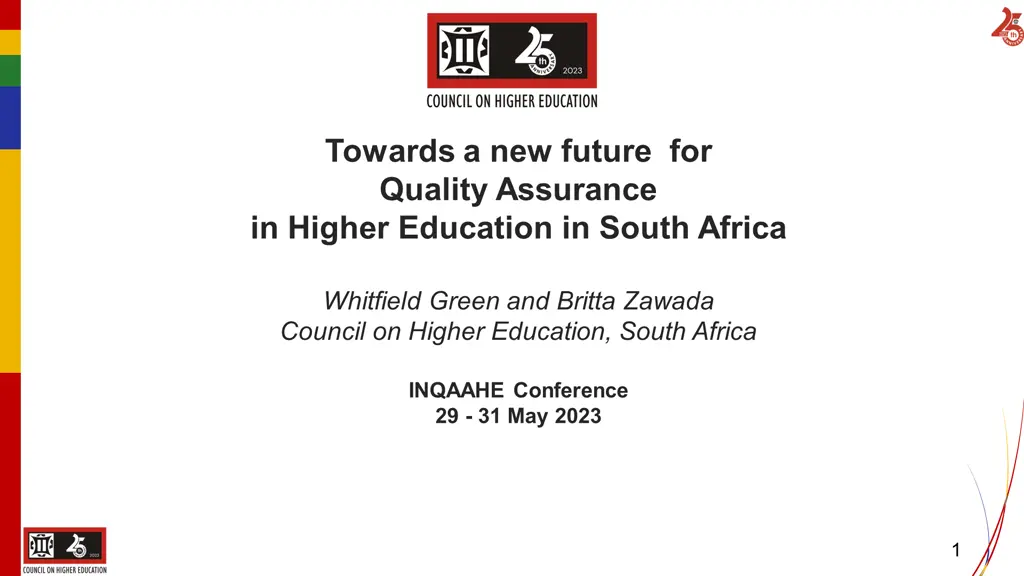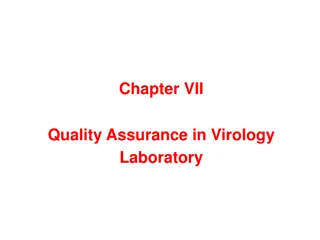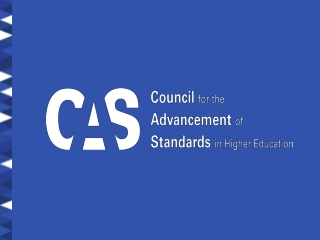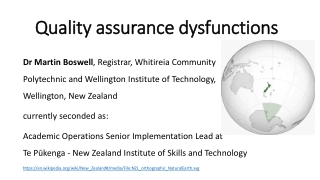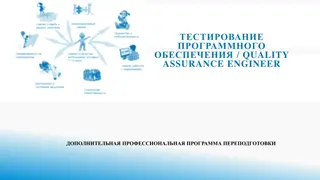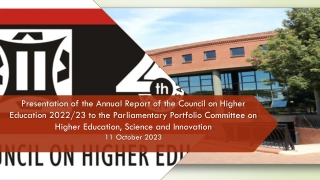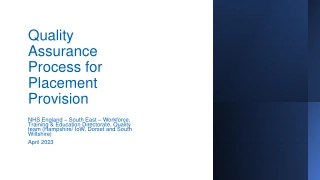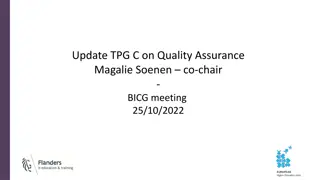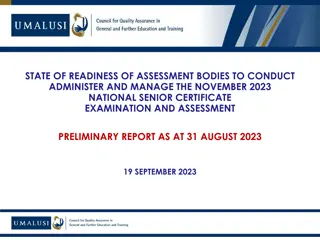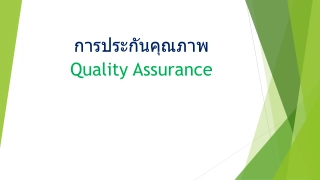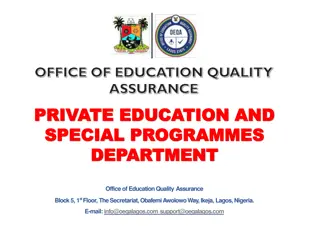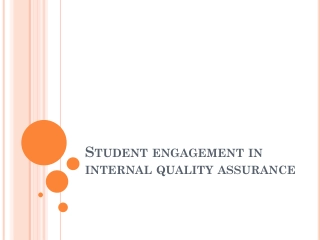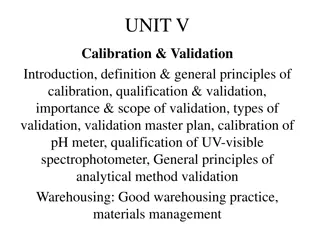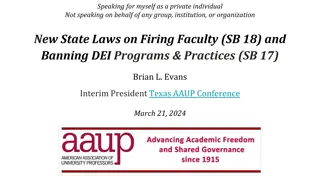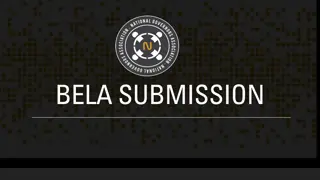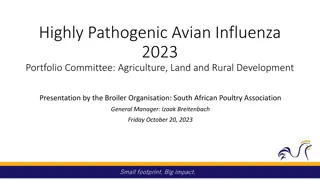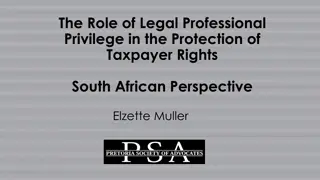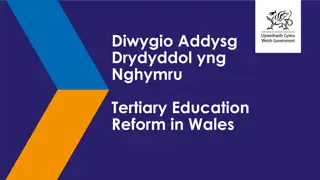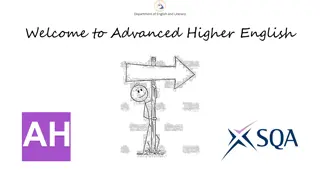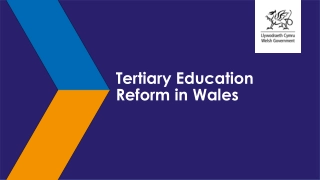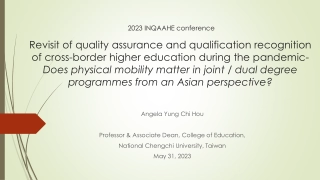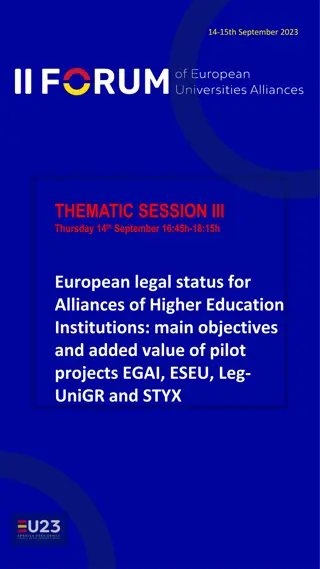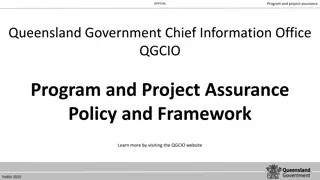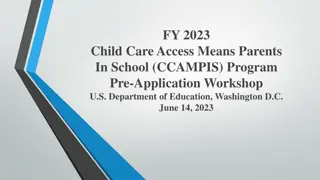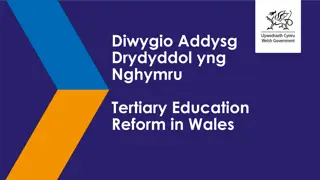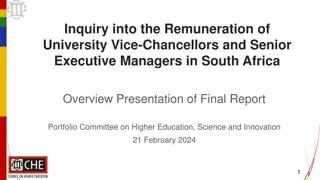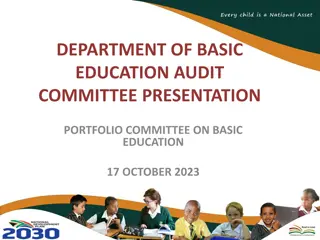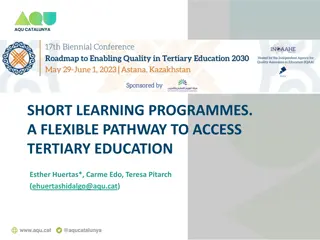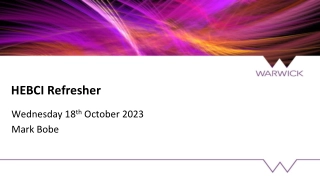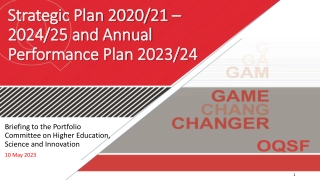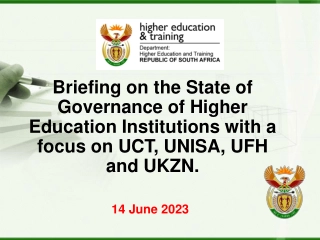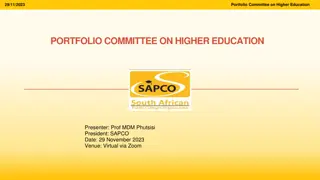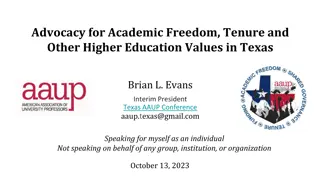Transforming Quality Assurance in South African Higher Education
Explore the evolution and challenges of quality assurance in HE, examining audit culture, transformation efforts, and contested quality concepts.
Download Presentation

Please find below an Image/Link to download the presentation.
The content on the website is provided AS IS for your information and personal use only. It may not be sold, licensed, or shared on other websites without obtaining consent from the author. Download presentation by click this link. If you encounter any issues during the download, it is possible that the publisher has removed the file from their server.
E N D
Presentation Transcript
Towards a new future for Quality Assurance in Higher Education in South Africa Whitfield Green and Britta Zawada Council on Higher Education, South Africa INQAAHE Conference 29 - 31 May 2023 1
Outline of Presentation Historical trajectories New Directions Drawing on digital affordances Some critical questions 2
The CHE and its work An independent statutory body and quality council responsible for: through programme accreditation, institutional audits, qualification standards development, national qualification reviews and capacity Quality assurance, promotion and enhancement Quality Assurance in HE development. Transformation of HE Transformation in HE Transformation by HE Promoting scholarship and building knowledge about HE. HE Research and Advice Transformation Oversight Transformation from the perspective of addressing inequality and building quality deep transformation Advising the Minister on HE matters and policies 3
The CHEs 25- years Quality Assurance Trajectory Accountability Enhancement Stewardship
A pervasive Audit Culture underpinning QA Audit culture as a condition .shaped by the use of modern techniques and principles of financial audit, but in contexts far removed from the world of financial accountancy the techniques and values of accountancy have become a central organizing principles in the governance and management of human conduct and the new kinds of relationships, habits and practices that this is creating. (Shore, 2008:278) Concerns about quality, risk and a crisis of trust in the higher education prevalent Audit culture conflates accountability with accountancy and may be viewed as an elaborate policing mechanism based on minimum compliance. Such an audit culture, however, can lead to concealing behaviour , where instead of accountability, data is deliberatively concealed to make institutions look as if there is good quality and compliance (Bamber & Anderson, 2012). Audit culture also runs the risk of alienating everyday academics because they feel that it devalues their everyday practices. If quality assurance is seen as a top-down practice where mindless conformity is expected, there will be conflict between quality assurance efforts and academics. (Bamber & Anderson, 2012). 5
Quality and Quality Assurance as contested concepts Who makes the decision what quality is? Based on what criteria or standards? In what context? For what purpose? What is contextually relevant and transformative quality? (Aluko, Letseka, & Pitsoe, 2016; Fresen & Boyd, 2005; Hauptman Komotar, 2020; Zawada, 2019) 6
New directions underpinned by a philosophy of Ubuntu The African value of Ubuntu is often presented in short statements (Samkange and Samkange 1980): Umuntu ngumuntu ngabantu (isiZulu) = A person is a person through other people. A collection of values and practices that people of Africa or of African origin view as making people authentic human beings. While the nuances of these values and practices vary across different ethnic groups, they all point to one thing an authentic individual human being is part of a larger and more significantrelational, communal, societal, environmental and spiritual world (Mugumabata 2020) More critical is the understanding of a person as located in a community where being a person is to be in a dialogical relationship in this community. A person s humanity is dependent on the appreciation, preservation and affirmation of other person s humanity. To be a person is to recognize therefore that my subjectivity is in part constituted by other persons with whom I share the social world. (https://iep.utm.edu/hunhu/ accessed on 10 March 2023) 10 Features of Ubuntu (Prozesky 2003- https://iep.utm.edu/hunhu/ accessed on 10 March 2023) Humaneness; Gentleness; Hospitality; Empathy or taking trouble for others; Deep Kindness; Friendliness; Generosity; Vulnerability; Toughness; Compassion 7
Quality Assurance: A Stewardship Approach Can we reimagine quality assurance as stewardship, rather than as policing, and will this approach result in a greater and more lasting positive impact on quality in higher education? With acknowledgment to Dr. Chera Reid and Shaady Salehi (https://www.evaluationinnovation.org/publication/toward-a-trust-based- framework-for-learning-and-evaluation/ ) who ask a similar question in the context of evaluation in trust-based philanthropy.
A new language of description Consultative Generative Collaborative Reflexive Responsibility Partnership Consensus Self-Reflection Peer- validation Responsiveness Community Context Difference Trust A different way of working 9
Quality Promotion Integrating functions Integrating themes QUALITY REVIEWS Learning & Teaching ACCREDITATION STANDARDS Transformation Capacity Development Comm. of Practice A new Quality Assurance Framework for Higher Education in South Africa QAF MIS 10 Integrating Structures
The QAF Management Information System (MIS) The QAF-MIS is a meta system, comprising of a number of individual operating systems that feed into a core system of institutional quality dashboards. The individual operating systems are the digital platforms that support and enable the range of QAF EQA functions to be carried out. They are end-to end solutions for each of the EQA functions and enable optimal digital management of the function. Selected data from the individual operating systems feed into the institutional quality dashboards. Dashboards are digital track records for each of the higher education institutions in which the decisions of previous EQA activities undertaken against agreed-upon standards, are inputed, collated, displayed, analysed and interpreted per institution. The Dashboards provide a view on quality at institutional level and at sectoral level at any given time. 11
The nature of higher education practice standards Standards are codes of practice typically worded as statements that enable reflection on the content addressed by the standard. Guidelines accompany each standard and these describe why the standard is important and describe how the standard might be interpreted and implemented in different contexts. A standards development rather than standards setting approach is used, which enables contextual responsiveness and enables a shift from a compliance approach to a developmental approach. Reflexive and generative methods are used to develop the standards and to engage with them on an ongoing basis. Standards are developed by communities of practice drawn from the sector, and are thus developed by the sector, for the sector. Standards not standardization. 13
Dashboards based on HEP Standards and Qualification Standards 3. Learning, teaching and assessment, programme management and provisioning 4. Programme and module design, review and improvement 1. Institutional agency and identity 2. Transforming Knowledges 7. Physical environments and experiences 8. Digital environments and experiences 5. Academic staff development 6. Experiential learning 10. Student academic and psycho-social support 9. Student Administration 11. Transitions into higher education 12. Transitions through higher education 13. Transitions from formal higher education 14. The Data Value Chain 16. Qualification Standards 15. Research and Innovation 14
QAF-MIS A minimum viable product to be in place in 2024 Accreditation Online Quality Reviews online INPUTS STORE, ANALYSE AND REPRESENT OUTPUTS Changing QA status over time per standard, and overall 15 1 (Not functional); 2 (Needs substantial improvement); 3 (Functional); 4 (Highly functional)
Levels of functionality against the standard Did not comply with the majority of the specified criteria for the HEPS. Level 1 (Not Functional) Not all minimum standards specified in the criteria for the HEPS were met. Problems/weaknesses could be addressed in a short period of time. Level 2 (Needs substantial improvement) All minimum standards specified in the HEPS criteria were met. Level 3 (Functional) All minimum standards specified in the HEPS criteria were met and, in addition, examples of good practice and innovation were identified in relation to several criteria. Level 4 (Highly Functional) 16
A Dashboard Example HEPS 3: Learning, teaching and assessment, programme management and provisioning 3 Overall 3 Accreditation 3 3 3 3 Qualification Reviews 3 4 3 3 Themed Reviews 3 3 3 Institutional Reviews 2 3 0 1 2 3 4 Overall Average Review 1 Review 2 Review 3 17
Some critical questions to consider The new approach is based on trust and responsibility. Are there any risks inherent in that? How do we build the understanding that an approach based on standards is not antithetical to a humanising approach to quality assurance? Is performance against a selection of standards in specific areas of higher education practices sufficient to reach an understanding on the state of internal quality at institutions? And is this sufficient to allow institutions which are regarded as functional to take greater responsibility for some elements of QA typically undertaken by the CHE? What are the challenges in reducing evidence-based qualitative decisions on quality made by peers based on standards to quantitative representations in visual digital dashboard displays? Is there a danger of the IQD system being viewed as a ranking system by the sector, rather than as a system that enables a differentiated approach, thus further entrenching elitism and competition? 18
References Aluko, F.R., Letseka, M. Pitsoe, V. 2016. Assuring Institutional Quality in Open Distance Learning (ODL) in the Developing Contexts New York: NOVA. Bamber, V. and Anderson, S. 2012. Evaluating learning and teaching: institutional needs and individual practices International Journal for Academic Development 17(1): 5-18. Better Evaluation nd https://www.betterevaluation.org/en Bolton, G. and Delderfield, R. 2009. Reflective Practice: Writing and Professional Development Sage: New York. Commonwealth of Learning. 2021. Quality and Equity in Digital Learning: A Policy Brief. https://www.tonybates.ca/2021/06/13/quality-and-equity- in-digital-learning-a-policy-brief-from-the-commonwealth-of-learning/, accessed 21 June 2021. Dzvimbo, K.P. 2010. From reflection to reflexivity: A conceptual journey. Conversations with Bourdieu, Woolgar, Foucalut and Bhabha. Unisa Seminar, College of Human Sciences, 8 March 2010. Fresen, J.W. and Boyd, L.G. 2005. Caught in the web of quality International Journal of Educational Development 25(3): 317 331. Mugumbate, Jacob Rugare; Chereni, Admire (23 April 2020). "Editorial: Now, the theory of Ubuntu has its space in social work". African Journal of Social Work. 10 (1). ISSN 2409-5605. Reid,C; Salehi, S. 2022. Towards a Trust-Based Framework for Learning and Evaluation. https://www.evaluationinnovation.org/publication/toward-a-trust-based-framework-for-learning-and-evaluation/, accessed 9 May 2023 Samkange, S., & T. M. Samkange. 1980. Hunhuism or ubuntuism: A Zimbabwe Indigenous Political Philosophy. Salisbury [Harare]: Graham Publishing, ISBN 0-86921-015-7. 106pp. 19
THANK YOU 20
